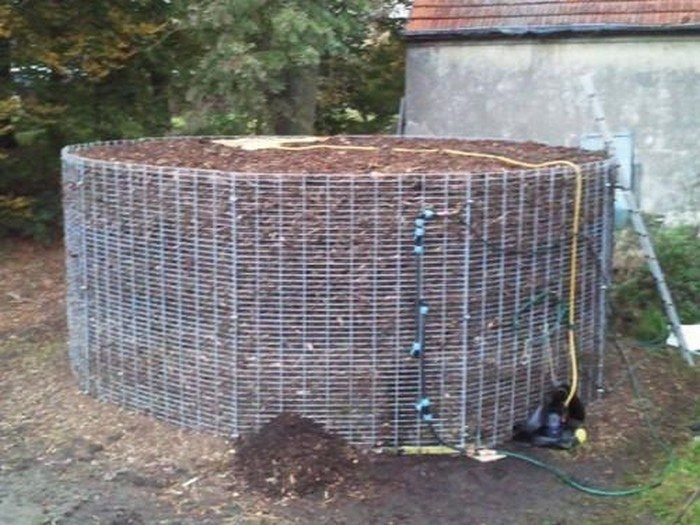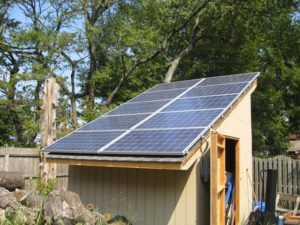Looking for an eco-friendly way to heat your off-grid home?
Consider harnessing the power of compost!
By converting waste materials into nutrient-rich soil, you can create a self-sustaining cycle that not only heats your home but also produces healthy fertilizer.
This innovative approach has gained popularity in recent years due to its potential for energy savings and reduced carbon emissions.
We’ll explore the ins and outs of compost heating systems so you can make an informed decision about implementing this technology in your own off-grid home.
Compost as a fuel source
Compost can be used as a fuel source for heating your off-grid home. It is a renewable and sustainable option that can reduce your reliance on fossil fuels.
By using compost as a fuel source, you can significantly reduce your reliance on non-renewable energy sources, thereby lowering your carbon footprint and contributing to a more environmentally friendly lifestyle.
To use compost as a fuel source, you’ll need to first create a compost pile by collecting vegetable scraps, leaves, and other organic materials and allowing them to decompose.
Once the compost has broken down into a rich, dark soil amendment, you can use it to fuel your home heating system.
This can be done through a variety of methods, such as burning the compost in a stove or furnace, or using it to power a biomass boiler.
One of the key advantages of using compost as a fuel source is that it is completely renewable and sustainable.
Unlike fossil fuels, which are finite and contribute to climate change, compost is a naturally occurring resource that can be replenished constantly.
Composting produces no emissions, making it a cleaner and healthier option for your home and the environment.
Overall, composting is an excellent option for off-grid homeowners looking for a reliable and sustainable fuel source.
With proper management and maintenance, compost can provide a consistent and renewable source of energy for your home, while also promoting sustainable living and reducing your environmental impact.
Composting toilets
Composting toilets can be used to generate heat for your home. These toilets use a mixture of sawdust and urine to produce a compost-like material that can be used as a fuel source.
Composting toilets offer a innovative solution for sustainable heating in your home.
These eco-friendly toilets utilize a combination of sawdust and urine to create a compost-like material that can be used as a fuel source.
The process begins by collecting urine in a separate container from the toilet bowl.
The sawdust is then added to the urine, creating a mixture that is then aerated and allowed to decompose.
The resulting compost-like material can be used as a fuel source for your home, providing a reliable and renewable source of heat.
The composting process also produces a valuable fertilizer that can be used to nourish your garden or yard.
By adopting a composting toilet system, you can reduce your reliance on non-renewable energy sources, lower your carbon footprint, and contribute to a more sustainable future.
Compost-powered heaters
There are a variety of heaters that can be powered by compost, including stoves, furnaces, and boilers. These heaters can be used to heat your home, hot water, and even your shower.
Compost-powered heaters are an innovative and eco-friendly solution for heating your home, hot water, and even your shower.
These heaters utilize the natural decomposition process of compost to generate heat, making them a sustainable and renewable energy source.
Stoves, furnaces, and boilers are just a few examples of the many types of heaters that can be powered by compost.
Stoves, such as the Compost Stove, use a combination of compost and air to produce a steady flame that can be used for cooking or heating.
Furnaces, like the Compost Furnace, use a similar principle, but instead of a flame, they produce a steady flow of heat that can be used to warm your home.
Boilers, such as the Compost Boiler, use the heat generated by the compost decomposition process to produce hot water or steam, which can be used for bathing, washing dishes, or space heating.
In addition to their environmental benefits, compost-powered heaters offer several practical advantages.
They do not require an external energy source, such as electricity or gas, which can save you money on your energy bills.
They also produce no emissions, making them an ideal choice for those looking to reduce their carbon footprint.
Furthermore, compost-powered heaters can be fueled by a variety of organic materials, including food scraps and yard waste, which can help to reduce waste and minimize your impact on landfills.
Overall, compost-powered heaters offer a reliable, sustainable, and eco-friendly solution for heating your home and hot water.
With their many benefits and practical advantages, it’s no wonder that these innovative heaters are gaining popularity among environmentally conscious homeowners.
Compost-powered heaters offer a reliable, sustainable, and eco-friendly solution for heating your home and hot water.
These innovative heaters use the natural decomposition process of compost to generate heat, which can be used for bathing, washing dishes, or space heating.
The heat is produced through a process called anaerobic digestion, where microorganisms break down the organic matter in the compost, releasing heat as a byproduct.
This heat can be harnessed and used to warm your home, providing a clean and sustainable alternative to traditional heating methods.
One of the biggest advantages of compost-powered heaters is their lack of reliance on external energy sources.
Unlike traditional heating methods that require electricity or gas, compost-powered heaters can operate independently, providing a more self-sufficient and resilient heating solution.
The compost used as fuel can be generated on-site, reducing the carbon footprint of your heating system and providing a closed-loop system that is easy to maintain.
With proper maintenance, a compost-powered heater can last for many years, providing consistent and reliable heat for your home.
Whether you’re looking to reduce your energy costs or simply live a more sustainable lifestyle, compost-powered heaters are an excellent choice for homeowners who want to make a positive impact on the environment.
Compost-powered heat exchangers
Heat exchangers can be used to transfer heat from one location to another. For example, you can use a heat exchanger to transfer heat from the compost pile to your home.
Compost-powered heat exchangers offer a sustainable and efficient solution for heating homes and other buildings.
These innovative systems harness the natural heat generated by composting processes to provide warmth and hot water.
By transferring heat from the compost pile to your home, you can reduce your reliance on fossil fuels and lower your energy bills.
The compost-powered heat exchanger consists of a network of pipes and fans that are installed in the compost pile and the building.
As the compost breaks down, it releases heat that is absorbed by the liquid in the pipes and carried to the building.
The system uses a heat exchanger to transfer the heat from the liquid to a water or air distribution system, providing warmth and hot water.
The benefits of compost-powered heat exchangers are numerous.
For one, they are a renewable energy source, as they rely on the natural process of composting to generate heat.
They can be more cost-effective than traditional heating systems, as they do not require the use of fossil fuels.
Plus, they can help reduce waste and promote sustainable living by utilizing compost as a resource.
To implement a compost-powered heat exchanger, you will need to consider several factors, such as the size of your compost pile, the type of heat exchanger you will use, and the insulation and layout of your building.
It is important to consult with a professional to ensure that the system is properly installed and maintained.
With proper care and attention, a compost-powered heat exchanger can provide reliable and sustainable heating for your home or building.
Compost-powered ventilation
Compost can be used to power a ventilation system for your home. This can help to circulate air and remove moisture, which can improve the indoor air quality.
Compost-powered ventilation is an innovative and eco-friendly solution for improving indoor air quality in your home.
By using compost as a fuel source, a ventilation system can be powered to circulate air and remove moisture, providing a healthier and more comfortable living space.
The compost is burned in a specially designed combustion chamber, producing heat that is used to ventilate your home.
This system can be especially useful in areas with high humidity or poor air circulation, as it can help to remove excess moisture and improve the overall indoor environment.
By using compost as a fuel source, this system can reduce your reliance on fossil fuels and lower your carbon footprint.
With proper maintenance and regular cleaning, a compost-powered ventilation system can provide years of reliable and eco-friendly performance.
Compost-powered air conditioning
Compost can also be used to power an air conditioning system for your home. This can be done using a heat exchanger and a fan.
Compost-powered air conditioning is an innovative and eco-friendly solution for cooling your home.
By using compost as a fuel source, you can power an air conditioning system without relying on traditional electricity or fossil fuels.
This is achieved through a heat exchanger and a fan, which work together to transfer the heat generated by the compost into the air conditioning system.
The heat exchanger is a device that transfers heat from one medium to another, in this case, from the compost to the air conditioning system.
The fan, on the other hand, is responsible for blowing air through the heat exchanger to facilitate the transfer of heat.
To set up a compost-powered air conditioning system, you will need to create a compost pile in a location that is accessible to the heat exchanger and fan.
The compost pile should be made up of a mix of organic materials such as vegetable scraps, fruit peels, and yard waste.
Once the compost pile is mature, you can use it to fuel your air conditioning system.
The benefits of using compost-powered air conditioning are numerous.
For one, it is a renewable energy source that is both sustainable and eco-friendly.
It can help to reduce your carbon footprint and lower your energy bills.
Plus, by using compost as a fuel source, you are also creating a nutrient-rich fertilizer that can be used to improve the health of your plants and soil.
Overall, compost-powered air conditioning is a revolutionary technology that has the potential to transform the way we cool our homes.
By harnessing the power of compost, we can create a more sustainable and eco-friendly future for ourselves and future generations.
Compost-powered hot water heating
Compost can be used to heat your hot water. This can be done using a compost-powered heat exchanger or by using the compost directly to heat the water.
Compost-powered hot water heating is an innovative and eco-friendly solution for households looking to reduce their energy consumption and carbon footprint.
This system utilizes the natural process of decomposition to generate heat, which can be used to warm water for household use.
There are two main approaches to compost-powered hot water heating: using a compost-powered heat exchanger or direct use of compost to heat water.
A compost-powered heat exchanger is a device that employs a process called anaerobic digestion to break down organic matter into biogas, which is then used to heat water.
This system is typically more expensive than the direct use approach, but it offers greater efficiency and can be more easily scaled up for larger households or commercial applications.
The direct use approach involves directly exposing the compost to water, allowing the natural heat generated by the decomposition process to warm the water.
This approach is simpler and more cost-effective, but it may require more frequent maintenance and monitoring to ensure proper function.
Regardless of the approach chosen, the benefits of compost-powered hot water heating are numerous.
For one, it reduces the reliance on fossil fuels and minimizes greenhouse gas emissions.
It can provide a reliable source of hot water even during power outages or in off-grid locations.
Furthermore, the compost itself can be used as a nutrient-rich fertilizer for gardening or agriculture, providing an additional benefit to the system.
Compost-powered hot water heating is an innovative and sustainable solution for households looking to reduce their energy consumption and carbon footprint.
Compost-powered hot water heating is an innovative solution that leverages the natural heat generated during the decomposition process to warm your water.
This approach can be achieved through a compost-powered heat exchanger or by directly using the compost-rich water.
While the latter method may require more frequent maintenance and monitoring, both options offer numerous benefits.
By reducing reliance on fossil fuels and minimizing greenhouse gas emissions, compost-powered hot water heating is an eco-friendly solution that provides a reliable source of hot water even during power outages or in off-grid locations.
The compost itself can be used as a nutrient-rich fertilizer for gardening or agriculture, further increasing the system’s value.
With two main approaches to choose from, compost-powered hot water heating is a practical and sustainable way to transition towards a more eco-friendly lifestyle.
Compost-powered space heating
Compost can be used to heat your living space directly. This can be done using a compost-powered stove or furnace.
Compost-powered space heating is a novel and sustainable approach to heating your living space.
Instead of relying on fossil fuels, this method utilizes the natural process of decomposition to generate heat.
Compost, which is simply decomposed organic matter, is burned in a stove or furnace to produce warmth.
This technology has the potential to revolutionize the way we heat our homes, offering a cleaner, more renewable alternative to traditional heating methods.
One of the main benefits of compost-powered space heating is its minimal environmental impact.
Compost is a waste product that would otherwise be sent to landfills, so using it as a fuel source reduces the amount of waste that is produced.
Because compost is made from organic materials, it produces no emissions or pollutants when burned, making it a much cleaner option than fossil fuels.
To implement compost-powered space heating in your home, you will need to install a compost-powered stove or furnace.
These devices are designed to burn compost efficiently and safely, and they can be customized to meet your specific heating needs.
Some of the key features to look for when selecting a compost-powered heating system include a well-insulated combustion chamber, a durable metal or ceramic heat exchanger, and a controlled combustion system that ensures safe and efficient burning.
Overall, compost-powered space heating is a practical and sustainable solution for heating your home.
By utilizing a waste product that would otherwise go to landfills, this technology offers a cleaner, more renewable alternative to traditional heating methods.
With the right equipment and maintenance, you can enjoy a cozy and comfortable living space while also doing your part for the environment.
Want More? Dive Deeper Here!
Hey there! If you’re the type who loves going down the rabbit hole of information (like we do), you’re in the right spot. We’ve pulled together some cool reads and resources that dive a bit deeper into the stuff we chat about on our site. Whether you’re just killing time or super into the topic, these picks might just be what you’re looking for. Happy reading!






